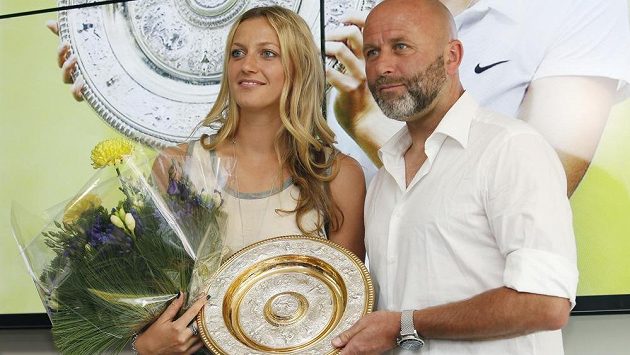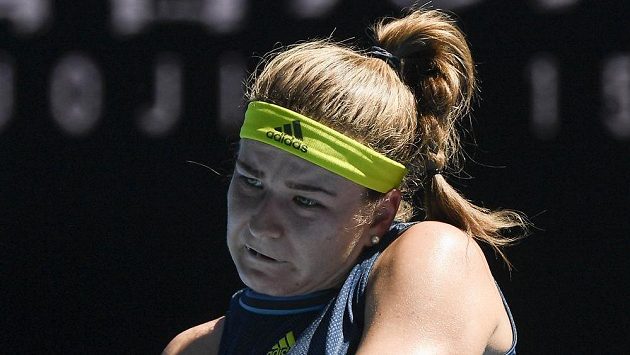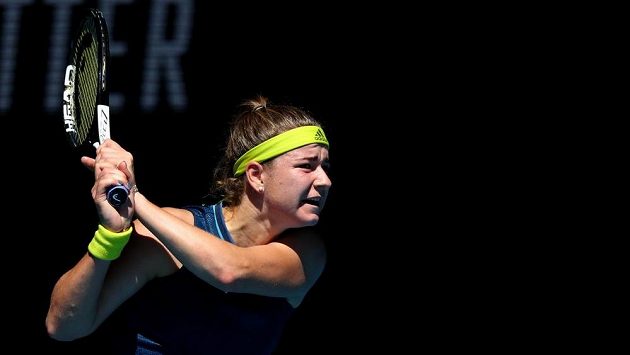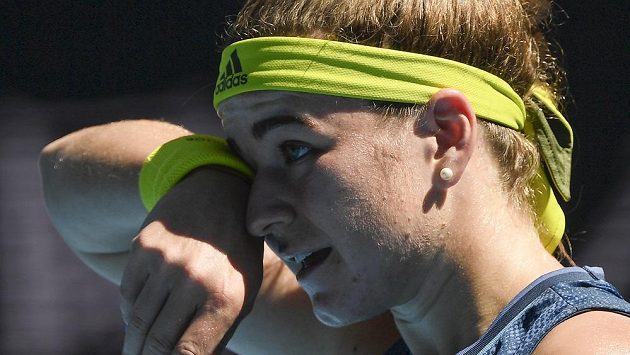How difficult is it to prepare an Australian Open semifinalist in a lockdown condition?
In truth, we are used to lockdown, because that’s how we started working with Kája. Now we are more worried about her injuries. He can only exercise easily, but due to the torn abdominal muscle, tennis is out of the question. So she is trying to work with a fitness trainer and should start intensive physiotherapy with Michal Novotný.
Do you have a plan for when she should start playing again?
Before in Miami (from March 23) it is out of the question and I almost dare say that she would play in Miami only if it goes very well. You can’t fly to Florida without tennis training. We’ll see how much time we have to work on the court and then we’ll decide. So far, it’s planned.
Karolina Muchova during the semifinals of the Australian Open.
Kelly Defina, Reuters
Have you set priorities for the rest of the season?
If the tournaments go as planned, the season will be overwhelmed by the fact that it is the Olympics. In the second half of April, the game is played in Stuttgart, and then there are Madrid, Rome, Roland Garros and then the grass, which is an excellent surface for Kája. She has to be prepared for that and I would especially like her to finish the rest of the season without injury. That would be great.
 –
–
Tennis player Petra Kvitová and coach David Kotyza after returning from Wimbledon.
Petr Horník, Right
When she returned from Australia, she explained what she intended to improve on her game. Did you agree with Carolina?
In Australia, she has made progress on the things we talked about last season. Mainly mentally. In other tennis things, whether technical or tactical, I still see space there. Now it’s about filling it out. For Kája, the semifinals of the Australian Open are the motivation for her to continue working. But she realized that it was necessary to use every loophole. Talent alone is not enough. It’s an advantage, but it’s not a guarantee that he’ll be at the top. We usually agree on where there is room for improvement.
Can you continue to use some online elements in coaching at this time, which you were forced to do by a few weeks ago?
We didn’t plan this situation. I got sick and couldn’t fly to Australia. Then, fortunately, Bára Štefková got there, who helped a lot and we were able to communicate. It seems to me as a way out of a bit of an emergency. We will see what the opportunity will be to travel. In Australia, each player had more limited space. Even if the conditions are strict, I do not expect the coach to stay at home at the computer. But in exceptional cases it works too, we tried it.
| KOTYZ’S MOST FAMOUS TRUST |
| Petra Kvitová (November 2008 – January 2016) |
| Caroline Wozniacká (April – August 2016) |
| Karolina Pliskova (December 2016 – September 2017) |
| Barbora Strýcová (January 2018 – November 2019) |
| Karolina Muchova (March 2020 – present) |
Karolína made no secret of the fact that she started working with mental coach Radek Šefčík. Do you know someone from the current female top who can do without psychological help?
This is a topic that some players do not come to light with, because there is an ingrained notion that when someone works with a psychologist, it is strange. It is important that the psychologist or mental coach works with both the coach and the player and that the triangle is balanced. I don’t know the background of all the top players, but with those I worked with, be it Petra, Kája Plíšková, Bára Strýcová, they all had someone who helped them with the mental side.
After many years on the tennis circuit with your players, do you still experience any surprising situations that will surprise you?
It’s true that I’ve been working with girls for a long time, but I admit that surprises are almost everyday. You plan something in the morning and during the day you are surprised that it doesn’t work that way, but in the evening you find out that it’s not really a surprise (laughs). It’s interesting, but I’m still learning and finding that some things can’t be planned.
 –
–
Czech tennis player Karolína Muchová in the quarterfinals of the Australian Open.
Andy Brownbill, ČTK / AP
Do you know that your player will have a day when no one can really beat her? Which is sometimes said mainly about Petra Kvitová.
Petra is extreme in that straightforwardness, in what game she played or plays when she can. The other girls have a different way to win. In the final, the win counts and it basically doesn’t matter how you get to it. There are situations when you feel like a coach: Today is D-Day. But I was often wrong too. On both sides. There are an awful lot of factors that affect this. Tennis is so unique by those rules. It’s nice that you don’t count it.
You yourself have characterized yourself as a rocker a few times in the past. Is it important for you to know what your charges listen to music, what movies they watch, what they read?
There is no need to dig into what someone is watching for the series and evaluate what the person is like accordingly. I try not to interfere with Kája’s privacy, it’s beyond me. But we definitely have something to talk about. And when it comes to music. Maybe according to her, I don’t listen to complete waste (laughs).
 –
–
Czech tennis player Karolína Muchová started a sensational performance at this year’s Australian Open.
Kelly Defina, Reuters
After the end of Tomáš Berdych’s career, we additionally appreciate how exceptional he was a tennis player. What do you think is that women manage to continuously educate top players?
This is for a very long conversation. But what permeates my experience with a large group of girls who have reached the top, is the significant involvement of parents. Especially for fathers, who shaped the girls a lot at the beginning of their careers. I see this as a big plus when it comes to the right end. Looking back ten years ago, it was also important how Petra motivated the other girls with her triumph at Wimbledon. Suddenly they saw a companion from Fulnek who grew up in normal conditions, without extreme financial support, she was not in any famous academy. A number of girls said to themselves: It’s okay, let’s try it too! And then one more unique thing.
A to?
When I compare it with the world, it is a job in the biggest tennis centers: in Prostějov, in Prague on Štvanice, on Sparta. Clubs work better than famous academies. When I worked in Prostějov, Petra Kvitová, Lucka Šafářová, Petra Cetkovská met during training. Tomáš Berdych, Radek Štěpánek … So skillful players were concentrated in one place that there was a chance that someone else would get out of it again.
 –
–
Czech tennis player Karolína Muchová in action at the Australian Open in the quarterfinals against Ash Barty.
Andy Brownbill, ČTK / AP
Ever since Serena Williams became pregnant, the circle of female tennis players has expanded significantly, with a penchant for a title at every grand slam that even unattached players can win. Do you think this will be the trend of the coming years?
It may be, but at the same time Naomi Osaka is taking on some reins. The way she had already won four grand slams was impressive. He can also be Serena’s successor with his play. I’m not saying he will win over 20 grand slams, but he’s bounced back. The field is wide, but Naomi is the one who leads the peloton and has a slight lead over it.
Is it still a motivation for you to lead your player to the grand slam title, even if you have already experienced it with Petra Kvitová?
I can’t think that much. I try to live in the present and help Kája. The feeling when she wins is nice, but then when the girl comes and says: Coach, help me, it’s important to me and it gives me the energy to keep going. Because that nomadic life is not entirely simple. I enjoy work and it fills me. And if I help someone, that’s fine.
– .


